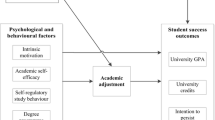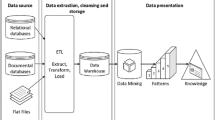Abstract
The purpose of this study was to explore whether useful regression models could be developed to predict student performance on the US Medical Licensing Examination (USMLE) Step 1, using pre-matriculation data and student performance outcomes available as early in the curriculum as possible. Additionally, we sought to determine if we could establish a model by which we could identify students who may need supplemental instruction early in the curriculum. Regression modeling revealed that a fairly strong predictive relationship exists when combining certain internally developed summative assessments and the National Board of Medical Examiners (NBME) Comprehensive Basic Science Examination (CBSE) with pre-matriculation variables. However, in our best regression model, > 40% of the overall variance in Step 1 scores could not be explained by the model. As a consequence, we propose using this type of modeling to facilitate timely deployment of student services to support individual students who are struggling. Future studies will focus on understanding what additional human factors fill this gap including student motivation, affect, and the factors that help students become “expert learners” (e.g., interactions with senior students, identification of test preparation materials).



Similar content being viewed by others
References
Donnon T, Paolucci EO, Violato C. The predictive validity of the MCAT for medical school performance and medical board licensing examinations: a meta-analysis of the published research. Acad Med. 2007;82(1):100–6. doi:10.1097/01.ACM.0000249878.25186.b7.
Wiley A, Koenig JA. The validity of the Medical College Admission Test for predicting performance in the first two years of medical school. Acad Med. 1996;71(10 Suppl):S83–5.
Julian ER. Validity of the Medical College Admission Test for predicting medical school performance. Acad Med. 2005;80(10):910–7.
Kleshinski J, Khuder SA, Shapiro JI, Gold JP. Impact of preadmission variables on USMLE step 1 and step 2 performance. Adv Health Sci Educ Theory Pract. 2009;14(1):69–78. doi:10.1007/s10459-007-9087-x.
Gonnella JS, Erdmann JB, Hojat M. An empirical study of the predictive validity of number grades in medical school using 3 decades of longitudinal data: implications for a grading system. Med Educ. 2004;38(4):425–34. doi:10.1111/j.1365-2923.2004.01774.x.
Gullo CA, McCarthy MJ, Shapiro JI, Miller BL. Predicting medical student success on licensure exams. Medical Science Educator. 2015;25(4):447–53. doi:10.1007/s40670-015-0179-6.
Glaros AG, Hanson A, Adkison LR. Early prediction of medical student performance on initial licensing examinations. Medical Science Educator. 2014;24(3):291–5. doi:10.1007/s40670-014-0053-y.
Johnson TR, Khalil MK, Peppler RD, Davey DD, Kibble JD. Use of the NBME Comprehensive Basic Science Examination as a progress test in the preclerkship curriculum of a new medical school. Adv Physiol Educ. 2014;38(4):315–20. doi:10.1152/advan.00047.2014.
Lee MW, Soborowicz M. Evaluation of team-teaching as a means of integrating microbiology and pharmacology. Med Sci Educ. 2015;25(4):497–502. doi:10.1007/s40670-015-0167-x.
Dunleavy DM, Kroopnick MH, Dowd KW, Searcy CA, Zhao X. The predictive validity of the MCAT exam in relation to academic performance through medical school: a national cohort study of 2001-2004 matriculants. Acad Med. 2013;88(5):666–71. doi:10.1097/ACM.0b013e3182864299.
Sandars J, Cleary TJ. Self-regulation theory: applications to medical education: AMEE Guide No. 58. Med Teach. 2011;33(11):875–86. doi:10.3109/0142159X.2011.595434.
Brydges R, Dubrowski A, Regehr G. A new concept of unsupervised learning: directed self-guided learning in the health professions. Acad Med. 2010;85(10 Suppl):S49–55. doi:10.1097/ACM.0b013e3181ed4c96.
Adam J, Bore M, McKendree J, Munro D, Powis D. Can personal qualities of medical students predict in-course examination success and professional behaviour? An exploratory prospective cohort study. BMC Med Educ. 2012;12:69. doi:10.1186/1472-6920-12-69.
Haight SJ, Chibnall JT, Schindler DL, Slavin SJ. Associations of medical student personality and health/wellness characteristics with their medical school performance across the curriculum. Acad Med. 2012;87(4):476–85. doi:10.1097/ACM.0b013e318248e9d0.
Lee KB, Vaishnavi SN, Lau SK, Andriole DA, Jeffe DB. “Making the grade:” noncognitive predictors of medical students’ clinical clerkship grades. J Natl Med Assoc. 2007;99(10):1138–50.
Kulatunga-Moruzi C, Norman GR. Validity of admissions measures in predicting performance outcomes: the contribution of cognitive and non-cognitive dimensions. Teach Learn Med. 2002;14(1):34–42. doi:10.1207/S15328015TLM1401_9.
Bing-You R, Hayes V, Varaklis K, Trowbridge R, Kemp H, McKelvy D. Feedback for learners in medical education: what is known? A Scoping Review Acad Med. 2017. doi:10.1097/ACM.0000000000001578.
Krupat E, Pelletier SR, Dienstag JL. Academic performance on first-year medical school exams: how well does it predict later performance on knowledge-based and clinical assessments? Teach Learn Med. 2017;29(2):181–187. doi:10.1080/10401334.2016.1259109.
Hairrel AR, Smith S, McIntosh D, Chico DE. Impact of pre-matriculation instruction on student acculturation and first-year academic performance in medical school. Med Sci Educ. 2016;26(4):519–23. doi:10.1007/s40670-016-0284-1.
Cutrer WB, Miller B, Pusic MV, Mejicano G, Mangrulkar RS, Gruppen LD, et al. Fostering the development of master adaptive learners: a conceptual model to guide skill acquisition in medical education. Acad Med. 2017;92(1):70–5. doi:10.1097/ACM.0000000000001323.
Author information
Authors and Affiliations
Corresponding author
Ethics declarations
Conflict of Interest
The authors declare that there is no conflict of interest.
Rights and permissions
About this article
Cite this article
Lee, M.W., Johnson, T.R. & Kibble, J. Development of Statistical Models to Predict Medical Student Performance on the USMLE Step 1 as a Catalyst for Deployment of Student Services. Med.Sci.Educ. 27, 663–671 (2017). https://doi.org/10.1007/s40670-017-0452-y
Published:
Issue Date:
DOI: https://doi.org/10.1007/s40670-017-0452-y




